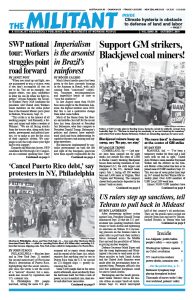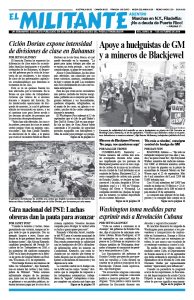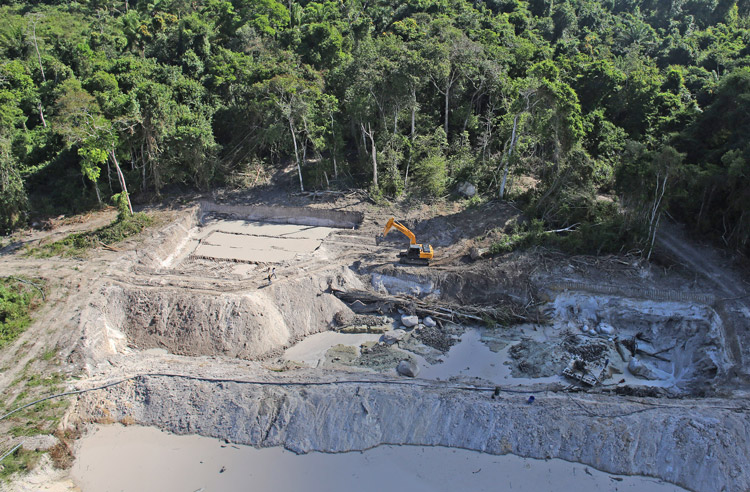Much liberal media space has been given to the fires currently burning in the Amazon in Brazil, with calls coming from “concerned” celebrities, bourgeois environmentalists and imperialist heads of state to “save the rainforest.”
In late August more than 93,000 fires were alight in the Brazilian Amazon, the highest number since 2010. But this is not a qualitative change from what came before.
Much of the blame from the liberals and middle-class left for the recent fires has been directed at President Jair Bolsonaro, who they compare to President Donald Trump. Bolsonaro’s policies and rhetoric have emboldened slash-and-burn deforestation by capitalist farmers and mining and logging operations.
But measures implemented by capitalist governments on both the left and right of the bourgeois spectrum have been equally responsible for the deforestation of the Amazon. The biggest difference is Bolsonaro doesn’t pay lip service to environmental concerns and the indigenous peoples living in these areas, as his predecessors in Brazil did.
More than 300 people, including many members of indigenous communities and local small farmers, have been killed during the last decade, mostly by paid thugs hired by big landowners and logging operations, Human Rights Watch reports.
During the Workers Party government of Dilma Rousseff — praised by the left — forestry law was reformed to reduce the number of protected areas in the jungle and the savanna.
What are the facts?
A closer look puts Brazil’s history and policies toward the Amazon into perspective.
While some figures indicate there has been an increase in the number of fires since 2018 — those that occur naturally, including from drought conditions, and those caused by slash-and-burn methods to clear the land — 2019 is simply not the worst year for fires in recent history.
NASA, which has recorded data on these fires since 1998 from space, indicated 2019 has had the most fire activity in almost a decade. But the worst was in 2005, with more than 142,000 fires in the first eight months, reported BBC News.
Deforestation of the Amazon rainforest to expand capitalist agriculture, livestock farming, legal and illegal logging and mining, and building of roads and dams, has been going on for decades.
It became more widespread in the 1960s, after the U.S.-backed Brazilian military overthrew the government of João Goulart and imposed a brutal dictatorship that ruled from 1964 to 1985. It pushed the use of fires to expand large-scale cattle ranching in a period of high world beef prices, with much hope for the country’s economic growth and development and to pay off its international debt. Eight million hectares of previously uncut forest were burned in 1987, an area double the size of Switzerland.
The destruction is not confined to the Brazilian Amazon. In Bolivia, President Evo Morales this year authorized “controlled” clearing and burning of forests in that country’s Amazon region, which has currently set ablaze 3,800 square miles near its border with Brazil and Paraguay. In Peru and Venezuela legal and illegal mining of gold and other minerals has uprooted hundreds of thousands of acres of the Amazon rainforest.
Imperialism breeds dependence
Despite its abundance of natural resources — cultivable high-yield soil, oil and natural gas, hydroelectric power, and metals essential to world industrial production — Latin America has been exploited and kept underdeveloped by U.S. and other imperialist powers.
This is what was behind the 1964 coup in Brazil, prepared and carried out with the full participation of U.S. rulers under Presidents John F. Kennedy and Lyndon B. Johnson.
These two liberal Democrats were determined to keep Washington’s control over Brazil’s resources and to prevent a repetition of the Cuban Revolution. The dictatorship they nurtured and armed eliminated all political rights in Brazil.
The latest export commodity boom started in 2003 and lasted for a decade to the benefit of both foreign and domestic capital before commodity prices collapsed. It drove the expansion of agricultural production in Brazil, Bolivia, Argentina and other South American countries to meet the global demand. U.S. food production monopolies like Archer Daniels Midland, Bunge and Cargill are among the prime imperialist looters of profits extracted from agricultural goods produced by Brazilian toilers, helping proliferate the fires.
Economic and technological control exercised by the imperialist monopolies and financial institutions ensures the perpetual dependence of Latin America, Asia and Africa within the imperialist order. Their methods include price manipulation of export products, high interest “development” loans, continuing overvaluation of the dollar, protectionist barriers, and when it is profitable, the dumping of excess products.
Protectionist measures are currently being pressed by the European Union powers in negotiations with the Mercosur trading bloc, which includes Argentina, Brazil, Paraguay and Uruguay.
A working-class alternative
Since the rise of the world capitalist order, humanity has faced questions of life or death in stemming capital’s accelerated destruction of labor and nature and its effects on hundreds of millions of toilers, says the 2007 Socialist Workers Party statement, “The Stewardship of Nature also Falls to the Working Class: In Defense of Land and Labor.”
These observations by the SWP leadership are important in finding the course to make progress on these questions, including the question of the Amazon forests and the fires.
The statement warns of the dead-end course of “green” politics and “environmentalism.” This course leads away from the working class fighting to resolve the contradictions bred by capitalist exploitation. The only road to end imperialist exploitation and to promote effective defense of labor and the earth’s land, waters and atmosphere is through the struggle for workers power. It’s only along that course that “the creative and productive potential of humanity’s transformation of nature will be set free.”
A good example are the mobilizations by peasants and workers in Burkina Faso from 1983 to 1987, led by a revolutionary government with Thomas Sankara as its central leader. From its position as one of the world’s poorest countries — a result of French colonial rule — working people in this West African nation took on agricultural development at the same time that they planted millions of trees and built irrigation projects to stop the advance of the desert. They did this as they carried out massive vaccination and literacy campaigns and other efforts to advance the interests of the toilers.
The “struggle to defend the trees and forests is above all a struggle against imperialism,” Sankara said in 1986 at a conference in Paris, “because imperialism is the arsonist setting fire to our forests and our savannas.”


